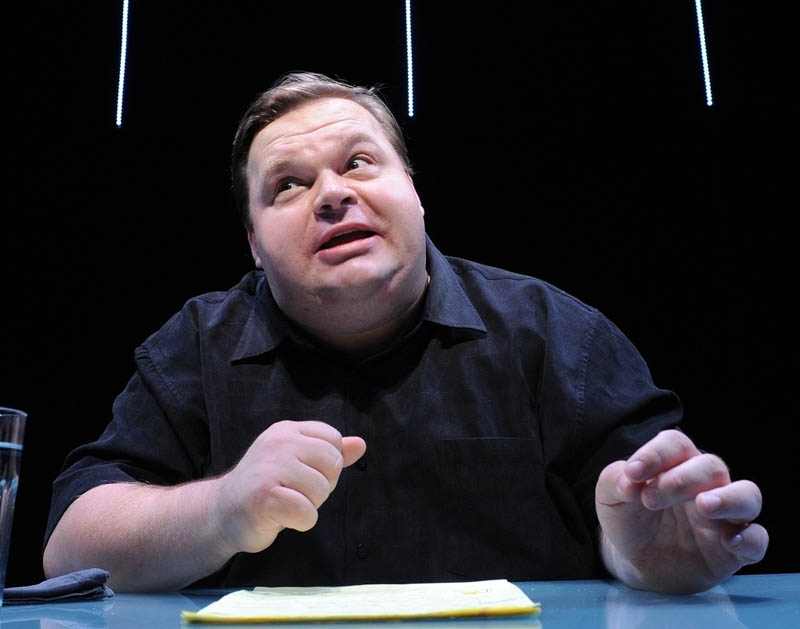WATERVILLE — A liar. A fabulist. A charlatan.
These are the words that performer Mike Daisey used to describe himself Monday during his one-man show “The Agony and Ecstasy of Steve Jobs,” a monologue that chronicles the rise of Apple Inc. and Daisey’s efforts to expose dangerous working conditions in the Chinese factories that make Apple products.
Daisey, a Fort Kent native who lives in New York City, performed his show Monday night at Colby College, his alma mater.
Daisey and his monologue have been the subject of controversy since March 16, when the National Public Radio show “This American Life” exposed some of Daisey’s claims as fabrications. Since then, Daisey has been the subject of countless newspaper articles and columns, some which call him a disgrace, among other things.
In response, Daisey has retooled the monologue he has performed about 150 times since 2010.
Some in the audience at Monday’s performance said the national criticism leveled at Daisey’s earlier version is disproportionate to his misdeed. The work is theatrical, they said, and shouldn’t be held to journalistic standards.
In March, “This American Life” host Ira Glass addressed his weekly audience with a surprise announcement.
“I’m coming to you today to say something that I’ve never had to say on our program. Two months ago, we broadcast a story that we’ve come to believe is not true,” Glass said.
In January, “This American Life” had broadcast excerpts from Daisey’s show during which the performer recalled details from a 2010 trip to China. Daisey said he visited a factory that makes Apple products. There, Daisey said, he witnessed inhumane conditions — child laborers, sufferers of chemical poisoning, a disabled man who had been maimed by machinery, gun-toting factory guards and more.
Before the broadcast, Glass asked Daisey if he applied journalistic standards to his reporting in China, according to transcripts. Daisey said yes.
After the broadcast, a public radio correspondent in China grew suspicious of Daisey’s claims. Through legwork and interviews with Daisey’s Chinese interpreter, the correspondent documented that many of Daisey’s claims were false.
“This American Life” interviewed Daisey for its March 16 broadcast and asked him about the fabrications.
Daisey came clean.
“The mistake that I truly regret is that (the excerpts appeared) on your show as journalism and it’s not journalism. It’s theater,” he said. “I use the tools of theater and memoir to achieve its dramatic arc.”
The show would go on
A few days before the March 16 broadcast, Daisey contacted the theater department at Colby College to let its chairperson know that a firestorm was brewing. Daisey, class of 1996, had already been booked to perform his act.
“Mike called me before the story broke and told me what was coming,” department chairwoman Lynne Conner said. “That weekend, I had a conversation with President (William) Adams and expressed my sense that we should honor our contract. And President Adams immediately expressed his agreement.”
The show would go on.
Conner said the reason for supporting Daisey’s performance is simple.
“We hired him to do a theatrical monologue. We had no expectation of journalism. He came and did a theatrical monologue and it was great,” she said of Monday’s show.
Before Daisey’s appearance, Conner addressed the controversy during a seminar for seniors in the theater department. The seminar focused on the role that theater can play toward providing news, ideas and discussion.
Ali Reader, from Minneapolis, Minn., said she attended the seminar, which provided context for Monday’s show. She said there was no consensus among students regarding the controversy, but a few things stood out.
“We found a really interesting divide between journalism and theatrical storytelling. How far can you push it before you’re breaking the rules, or outraging one community or another? Can you play on that line? And how has Mike Daisey grappled with it?” she said. “The truth gets stretched and things get changed to tell a story. That’s something we study a lot. We’re artists, and part of being an artist is being able to take artistic liberties.”
Trip Venturella, of Roxbury, Conn., agreed there was no consensus, but offered his own opinion on Daisey’s previous version.
“He has a right to invent those details to create emotional truths. He doesn’t necessarily have a right to present it as a piece of reporting,” he said.
Conner said monologues, by their nature, aren’t meant to be taken literally or journalistically, but they have the power to convey emotional truth. She added that “This American Life,” would seem like a natural venue for Daisey’s approach, because of frequent contributor David Sedaris’ autobiographical essays on the show.
“They frame their shows in Act I, Act II and Act III,” she said. “I personally find it a little confusing what made Ira Glass so very angry. When I go into a theater to see a theatrical monologuist, I understand it from a theatrical frame and I have no confusion about that.”
Reached by telephone Tuesday, Daisey put a finer point on the situation.
“The producers of ‘This American Life’ chose to view it as journalism,” he recalled. “I did not disabuse them of that notion.”
‘You should not trust me’
On Monday night, Daisey sat center stage among a few props — a table, a chair and a glass of water — and performed the show a second time since the March 16 broadcast.
He modulated his voice through a range of emotions and volumes. Sometimes he whispered quietly to his audience. Sometimes he exploded with shouts, spraying spittle through the spotlights like embers from an open fire.
Daisey asked his audience to carefully consider the show’s content.
“You should not trust me,” he said. “I think that’s clear, isn’t it? It’s been made very, very clear you should not trust any story I would tell. After all, I am a storyteller.
“You should never trust a storyteller to tell you anything but the truth.”
Ben McCanna — 861-9239
bmccanna@centralmaine.com
Send questions/comments to the editors.




